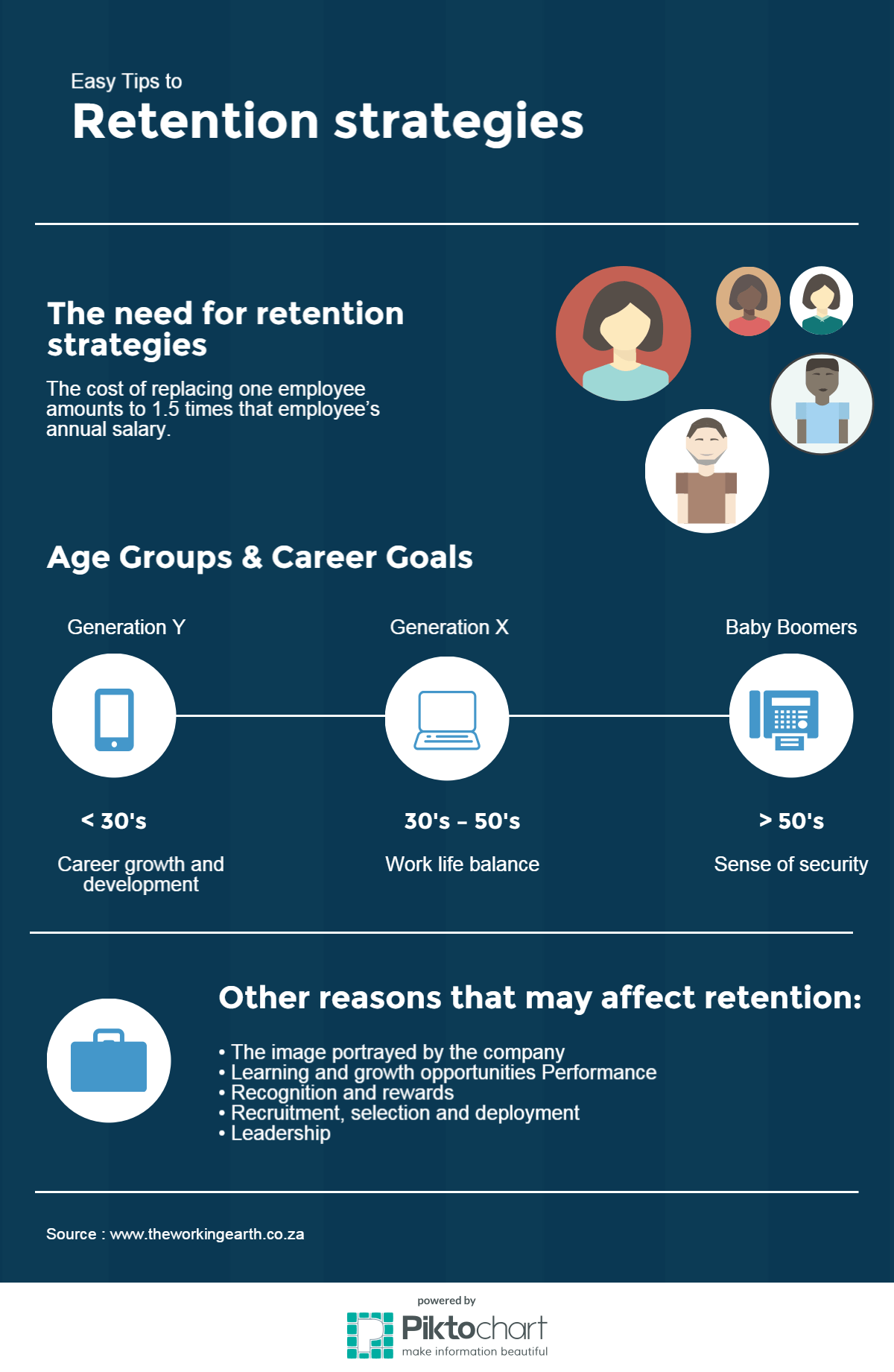We're now a level 2 BBB-EE Contributor
Employee Retention Strategies: How to Keep Your Best Hires
The need for retention strategies
Employee retention is a vital business survival tool. Employee retention does not only impact talent and experience but also has an adverse effect on the business' bottom line. According to experts the cost of replacing one employee amounts to 1.5 times that employee's annual salary . The market remains an employee's market and top talent will move on to employers who better satisfy their needs.
Factors to consider when setting retention strategies for your company
Retention strategies need to be designed on factors that affect whether or not employees stay or exit. Exit interviews are arguably fallible but more reliance may be placed on opinion surveys to identify areas of dissatisfaction.
An understanding of how different generations or age groups influence the overall work force is necessary. Generally employees younger than 30 years old are focusing on career growth and development, the age group between 30 – 50 focuses on work life balance and the age group older than 50 seeks a sense of security. Company A comprises mostly 20-30 year age group which therefore implies that career growth is mandatory to retain them. The infographic below summaries the factors to consider when setting retention strategies for your company.
Other reasons that may affect retention:
- The image portrayed by the company
- Learning and growth opportunities
- Performance recognition and rewards
- Recruitment, selection and deployment
- Leadership

It is often the attractiveness of the market that determines whether employees leave a company, but the company should also base their strategies on the competitiveness of the market. Retention strategies should be based on the reasons for the high staff turnover and the results of the "satisfaction" or "reasons for leaving" survey.
Consider the following when setting retention strategies at your company:
- When selecting and promoting employees, ensure that they have the necessary capabilities to match the demands of the job at hand. Poor and hasty selection and promotion decisions can contribute to turnover. Not every performing consultant will be a good manager - they each require a different set of skills and personality.
- By giving new employees the correct training and support when they join the organisation, this may reduce loss of new staff also known as the "induction crisis". A favourable view of the organisation in the minds of the new employee needs to be established so that they are more likely to stay. Effective feedback should be obtained from the employee in a short period of time to establish whether there are any issues.
- Uncompetitive, inequitable and unfair pay systems need to be dealt with - but there is an extent to which candidates can be swayed by monetary gain.
- Jobs need to be designed in such a way that they maximise skill variety, autonomy, significance. Learning and growth needs to be built into the job design. Certain roles can also be customised to meet the individual's particular needs.
- Social ties within the company should be encouraged at all times. Although it may seem that loyalty to companies may be diminishing, loyalty to colleagues are not.
- Put measures and policies in place to improve work life balance by recognising the need of employees outside of the work environment.
- Train and educate managers and team leaders so that they realise that they can make a positive contribution to improving retention by the ways in which they lead and manage their teams
- Ensure that there are policies and measures in place to protect those employees who are being harassed by or mistreated by superiors.
It is apparent how critical the need for retention strategies are to every company. Look out for my next blog on employer retention tools and how to create retention strategies for your company…
The Working Earth Pty Ltd is a Level 1, AAA+ Empowerdex BBBEE rated recruitment solution provider, offering innovative, tailor-made recruitment solutions as an alternative to traditional recruitment. Contact us to find out how we can help you and your organisation, call us today on 011 475 9668.
Author: Wendy Kirstan, General Manager (The Working Earth)









The Working Earth is a Talent Solution provider, with 23 years Professional Staffing Solutions experience. We are Specialists in Executive level Head Office and Shared Services roles in HR, Legal , Finance, Executive Sales and Commercial roles
Quick Links
CONTACT US
7 Naivasha Road
Corner of Eglin Road (entrance in Eglin Road)
Sunninghill 2157
Business Hours
- Mon - Fri
- -
- Sat - Sun
- Closed

